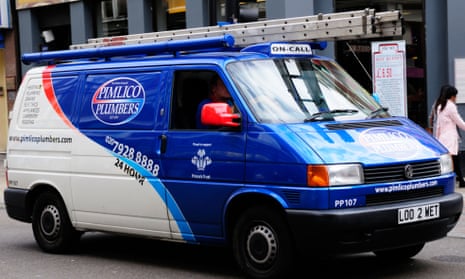The predicament of a plumber who claims he was dismissed because he wanted to go part time is being examined by the supreme court in a test case that could decide employment rights for all of those in the so-called “gig” economy.
Pimlico Plumbers, which has lost at every stage of the legal dispute, has appealed to the UK’s highest court to argue that those it sends out to repair leaking pipes and malfunctioning dishwashers are self-employed and not “workers”.
Workers do not enjoy the full range of employment protection rights given to full-time staff but are entitled to significant elements such as holiday pay.
The supreme court’s judgment, which is expected to be reserved, will set a clear precedent for other gig economy disputes such as that between the cab firm Uber and its drivers.
The original claim was brought by Gary Smith, from Kent, who worked for Pimlico Plumbers for six years until 2011. He had a heart attack and claims that his request for three days a week was rejected, the Pimlico Plumbers van he rented was taken away and he was dismissed.
Q&ADo you use companies or services that employ gig economy workers?
Show
We would like to find out how consumers opinions and habits might be changing in light of stories about companies employing gig economy workers.
You can share your views here via our encrypted form. They will help our journalists have a more complete picture and we will use some of them in our reporting.
Addressing the court, Thomas Linden QC, for Pimlico Plumbers, said not every contract to provide services implied entitlement to employment rights.
Linden said he was not clear what Smith and his lawyers “assert the law to be”. They do not, he said, define what should be the correct test of who is a worker and who is a self-employed contractor.
He continued that Smith “was a skilled tradesman” at a time when plumbers and heating engineers were in short supply in London and could command “relatively high hourly rates”. The claimant’s specialist skills placed him in a strong bargaining position, Linden told the court.
Linden said Pimlico Plumbers disputed Smith’s assertion that he was sacked because he wanted to work fewer days.
The company had asked for details of his medical condition after he had a heart attack but only ever received a sick note, Linden said. “Thereafter the claimant did not seek work,” Linden said. “[Smith] was asserting that he could not work five days a week because he was self-employed.”
Smith was registered for VAT, paid tax on a self-employed basis and worked solely for Pimlico Plumbers during his time with the company.
Charlie Mullins, the company’s founder, was in court to listen details of legal argument.
The hearing continues.
